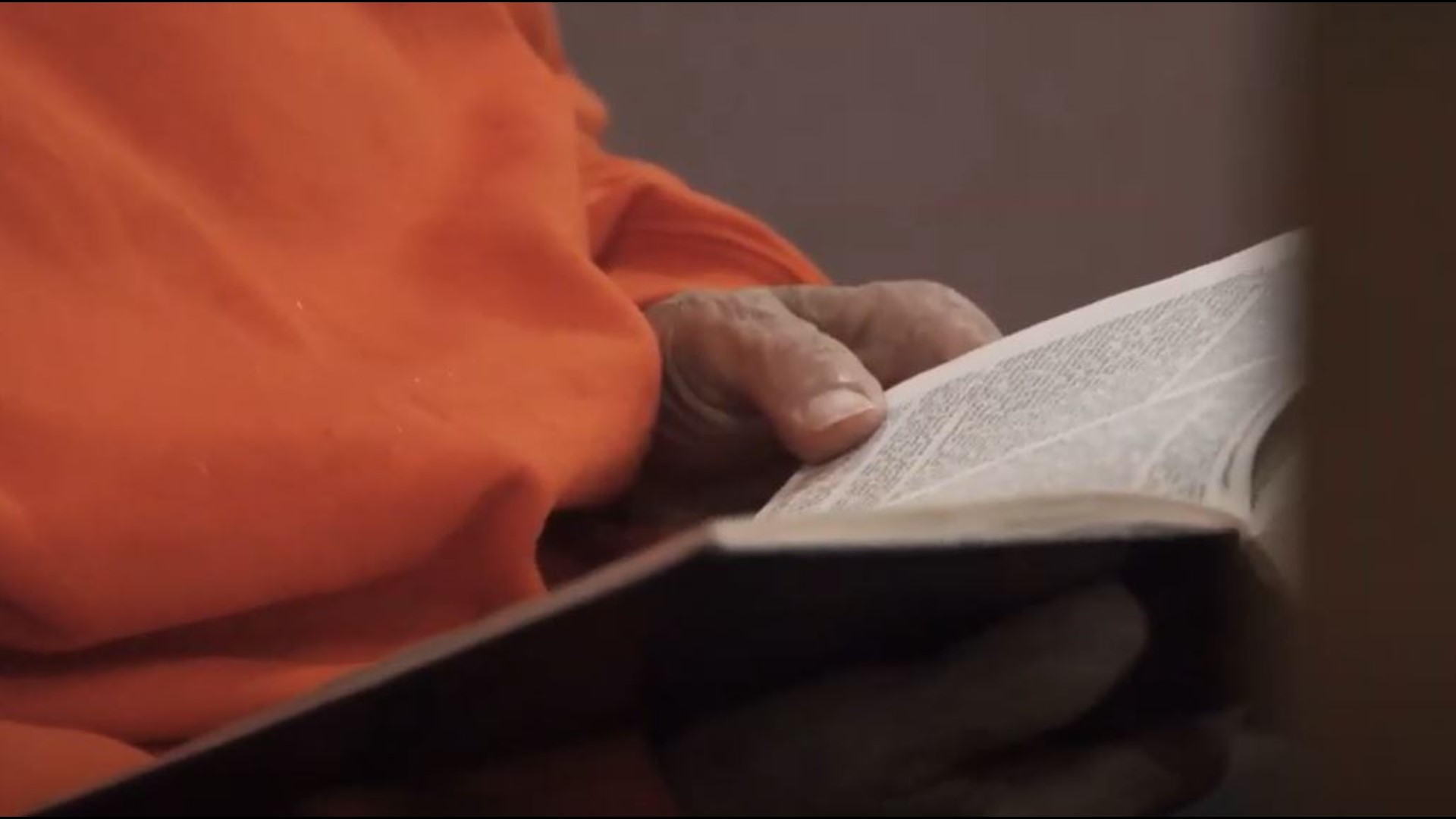LANCASTER, Texas — First Christian Church Rev. Melissa Bitting thought it had to be a clerical error when the congregation received notice that someone else owned their Lancaster church.
“We thought Dallas County had just lost their mind, that they just messed up,” Bitting told WFAA.
Bitting and her small flock soon discovered it was no clerical error.
Records filed in March 2019 with the Dallas County Clerk showed that an individual claiming to be the church chairman deeded the church, a property valued at $700,000, to a non-church member for $10.
Bitting told WFAA no one at the church knew the person who claimed in the deed to be the church’s chairman.
“The first thing, of course, we did was call the police,” Bitting said. “This was not just little bitty fraud. This was big fraud.”
Bitting leads a graying and elderly flock.

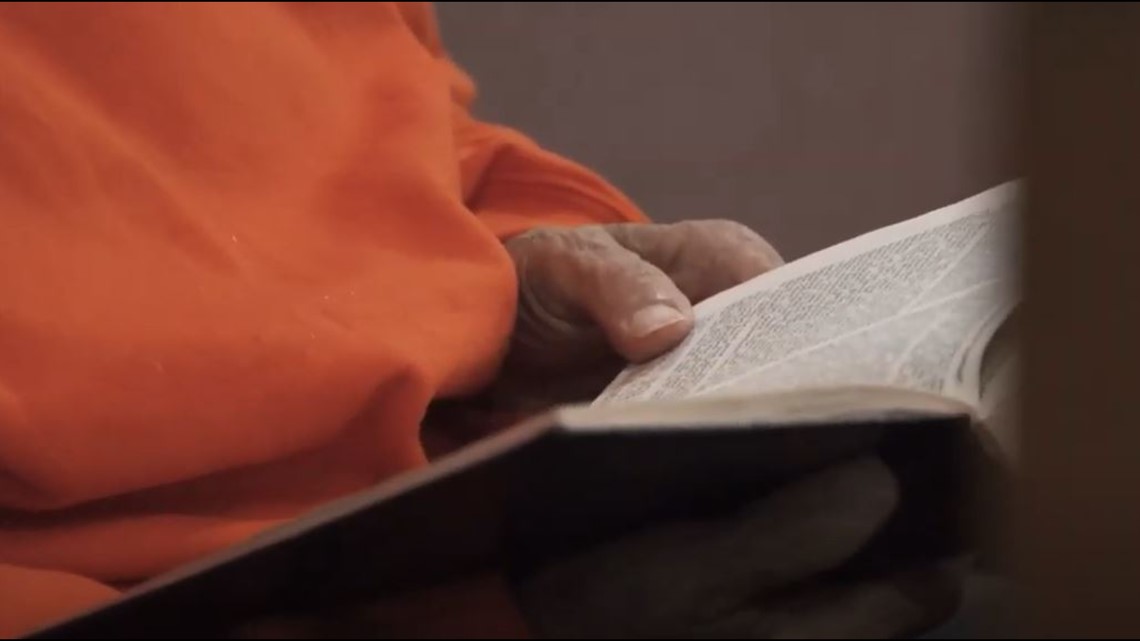
The church congregation is more than 170 years old and one of the oldest in North Texas. A historical marker in front of the church goes further: It says the church is “one of the oldest Christian congregations in continuous service in the state.”
So how can something like this happen to them?
When someone files a property deed with the county clerk, checks to see if it’s legit are limited.
In some cases, scammers forge people’s signatures on deeds – even the signatures of dead people, a WFAA investigation found in 2019.
Those deeds allow them to take control of property they don’t own. In some cases, scammers sell or rent it to make money.
In 2019, WFAA revealed how a convicted felon, Arnoldo Ortiz, already in prison for deed fraud, was able to do it again from behind bars. Last year, Ortiz received a two-year sentence on his latest offenses. That’s in addition to the 10-year prison sentence he already was serving.
“Deed fraud. It's pretty easy to do,” said Phillip Clark, a Dallas County assistant district attorney who specializes in financial fraud cases such as deed fraud.
Clark told WFAA that the DA’s office has identified at least 90 properties taken through deed fraud over the past two years. He believes there are many more.
“The properties that are affected by this deed fraud really run the gamut of value from depressed, abandoned homes, to multi-million-dollar homes,” he said. “I’ve even had some cases involving commercial or retail properties. It all depends on just how brazen the fraudster wants to be.”

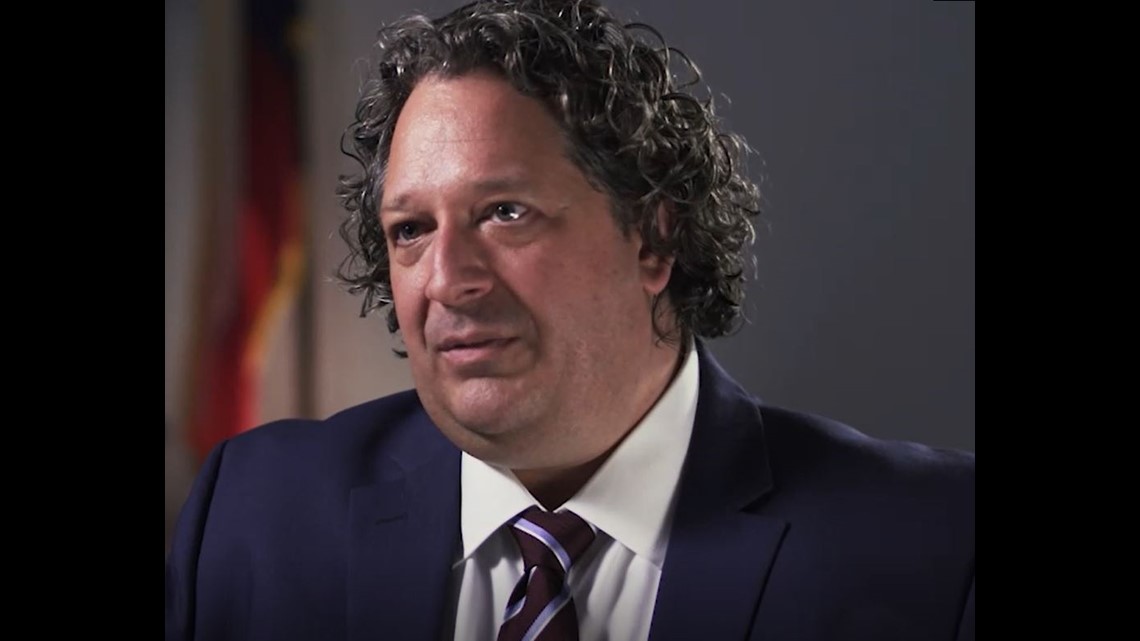
Clark told WFAA that criminals involved in deed fraud usually steal multiple properties.
“It's pretty rare that I see somebody who does one or two,” Clark said. “But looking at the person's themselves, no, I have seen people of different ages, all the different demographic groups.”
It may be easy to file a fraudulent deed, but it’s difficult and expensive to undo, Clark said. The law puts the onus on the victim to fix it.
The person or business that’s been a victim of deed fraud can’t just go to the courthouse and file their own deed. They have to go to court and get a judge to agree that the deed was fraudulent so the property can be transferred back to the rightful owners.
“You have to spend the money,” Bitting said. “You have to secure a lawyer. You have to take off time to go get the paperwork. That makes no sense.”

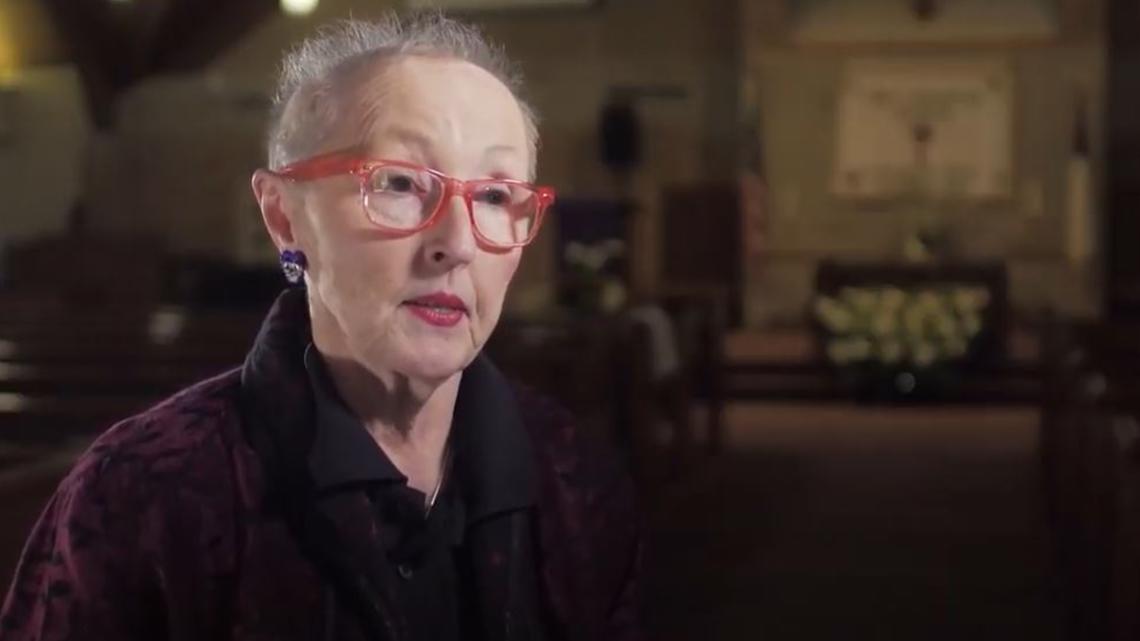
When the deed was filed with the county clerk, it transferred ownership from First Christian Church to Whitney Foster of True Foundation Non-Denominational Church. The individual listed on the deed as granting the transfer is described as the “chairman” of the First Christian Church.
Bitting provided WFAA a copy of a $10 check Foster wrote. The check was dated March 18, 2019. Bitting says Foster put it in the offering plate. The memo line on the check says it’s for a “donation.”
“I cannot imagine the audacity of this gentleman to come and worship with us like he did one Sunday morning before he stole the property,” Bitting said.
In a telephone interview with WFAA, Foster told WFAA that he believed the building was vacant and said he had been cutting the grass.
He said he put a $10 check in the mail and believed he was within his rights to acquire ownership of the property.
“You can acquire a property for $10 with nonprofits,” he said. “The church is community property. …. It wasn’t Whitney buying it. Our church was getting it. I was fixing to open up a church there.”

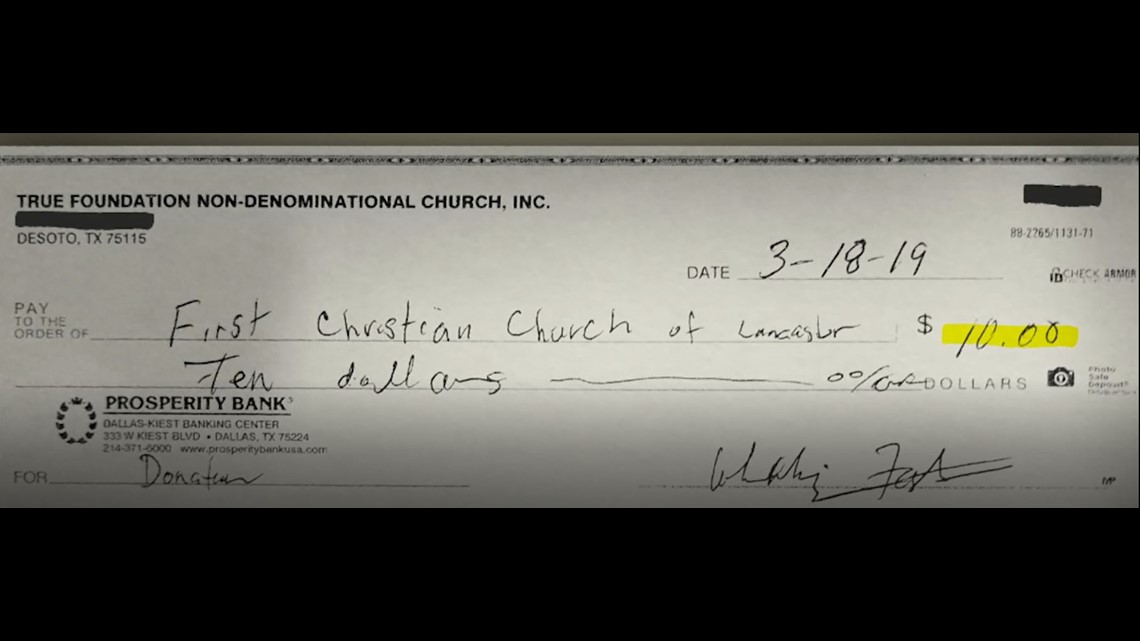
Bitting also provided WFAA a copy of the letter the church’s attorney sent to Foster.
The letter stated that the deed Foster filed with the clerk’s office was “fraudulent in all respects.” It demanded that he sign the “release” of deed sent to him by the attorney within 21 days.
Foster told WFAA that he signed the papers, but the attorney called and told him to redo it. Foster said he told the attorney he would redo it when “he sent my check back.”
“I wanted my $10 check back,” he said. “That’s all I asked for.”
Bitting said because Foster never returned the notarized paperwork, the “release” of deed could not be filed with the county clerk’s office. That meant the church was forced to go through the court system to get the property back in its name.
According to police records, Foster told a detective that he believed “since his donation of $10 went through, he had rights to the property.”
A police detective also questioned the person listed on the deed as the “chairman” of the church. Lancaster Police records said the man “immediately stated he was not the chairman or grantor of the property….”
WFAA also reached out to the same individual who also admitted he was not the “chairman” of the church. When asked if he remembered signing the deed documents, he said, “let me call you right back.” But he did not call back.
Clark, the Dallas County prosecutor, says often in cases of deed fraud, unsuspecting buyers are on the losing end of the deal. When those buyers go through a title company, the title company is on the losing end of the transaction.
“If they do look in the records, they see, again, what appears to be a legitimate, certified document, and there's no reason for them to know otherwise,” Clark said.
The vast majority of deed fraud occurs when people file in person at the county clerk’s office, he said.
Proposed bill could reduce fraud
Legislation has been filed that's intended to make this type of crime much more difficult to commit.
The bill written by Rep. Yvonne Davis, D-Dallas, would allow county clerks across the state to require property owners filing a deed in person to provide photo identification, and make a copy of it. Currently, only Harris County requires property owners to provide photo IDs when filing deeds in person.
“I think this is to protect everyone from the bad actors,” Davis told other lawmakers in late April. “All Texans ought to enjoy the protections to make sure they’re not defrauded of their property and deeds are not changed without their knowledge.”

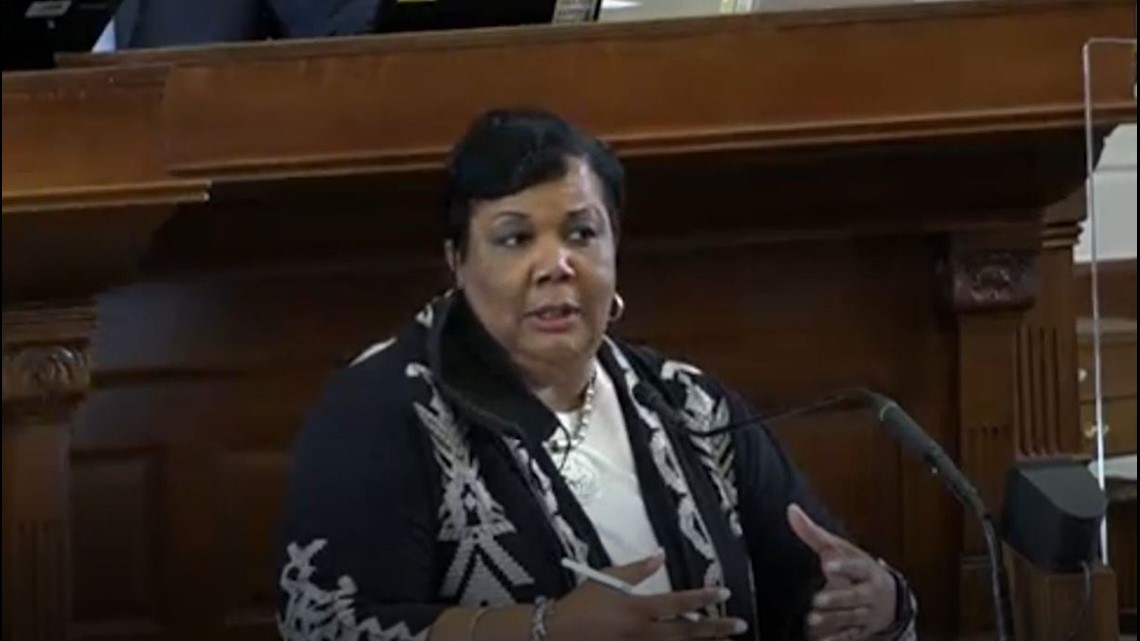
If the legislation is adopted, Texas counties will not accept in person deed filings from people who don’t have or refuse to provide photo ID.
“I think that it might give some people pause and they may just decide not to file that fraudulent deed,” Clark said.
Clark says it will also help law enforcement to investigate suspected cases of deed fraud.
In February 2020, a judge signed an order reinstating First Christian Church as the rightful owner of the property.
In late April, a Dallas County grand jury indicted Foster on a count of felony theft in connection with the fraudulent deed.
Foster, a convicted felon, was previously convicted of fraudulent use of identifying information and arson.
“I think it's bad enough that you do it against a home, but to do this against a church, and against God's house,” Bitting told WFAA. “To me, I would not want to meet my maker having done something like that.”

